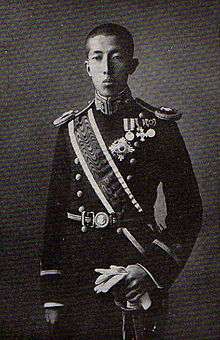Prince Fushimi Hiroyoshi
Prince Fushimi Hiroyoshi (伏見宮博義王, Fushimi-no-miya Hiroyoshi-ō, 8 December 1897 – 19 October 1938) was the eldest son of Prince Fushimi Hiroyasu, and heir-apparent due to inherit the position of 24th head of the Fushimi-no-miya shinnōke (collateral branch of the Imperial Family of Japan), and a career officer in the Imperial Japanese Navy.
| Prince Fushimi Hiroyoshi 伏見宮博義王 | |
|---|---|
| Hereditary Prince Fushimi | |
 | |
| Born | 8 December 1897 Tokyo, Japan |
| Died | 19 October 1938 (aged 40) Tokyo, Japan |
| Spouse | Tokiko Ichijō |
| Issue | Mitsuko Fushimi Hiroaki Fushimi Yoshiko Fushimi Ayako Fushimi |
| Father | Prince Fushimi Hiroyasu |
| Mother | Tsuneko Tokugawa |
| Military career | |
| Allegiance | |
| Service/ | |
| Years of service | 1920-1938 |
| Rank | Captain |
| Commands held | 6th Destroyer Group 3rd Destroyer Group Amagiri Kamikaze Yomogi Kaba |
| Battles/wars | Second Sino-Japanese War |
| Awards | Grand Cordon of the Order of the Paulownia Flowers |
Early life
Prince Fushimi Hiroyoshi was the eldest son and heir of Admiral of the Fleet Prince Fushimi Hiroyasu and his wife, the former Tokugawa Tsuneko. He graduated from the 45th class of the Imperial Japanese Naval Academy in 1920, ranked first in a class of 89 cadets. His classmates included Kosaku Ariga, final captain of the battleship Yamato.
Military career
Prince Fushimi served his midshipman tour on the cruiser Iwate, and as a sub-lieutenant on the battleships Fusō and Kawachi. After completing coursework in naval artillery and torpedo warfare, he served as a crewman on Kongō, Hyūga, Kirishima and Hiei. After completing advanced training in torpedo warfare, he was assigned as Chief Torpedo officer on the destroyers Shimakaze, Numakaze, and cruisers Izumo and Naka. On 10 December 1928, he received his first command, the destroyer Kaba. He was subsequently captain of the destroyers Yomogi, Kamikaze, and Amagiri.
In 1933, the Prince was promoted to commander and became executive officer on the cruiser Naka, followed by the minelayer Itsukushima.
In 1936, Prince Fushimi became commander of the 3rd Destroyer Group, which was involved in combat in the Battle of Shanghai between Japanese and Chinese Nationalist forces during the opening stages of the Second Sino-Japanese War. On 25 September 1937, he was slightly injured in the Huangpu River during a bombardment operation. After recovery, he served as commander of the 6th Destroyer Group, assigned to patrols in the Yangtze River of China.
In April 1938, he was assigned back to Japan, where he became the instructor of a Naval War College.
On 19 October 1938, Prince Fushimi, who suffered from chronic asthma, died of myocardial infarction. It is said that the cause of his death was an unsuitable medicine which was injected by his doctor. His military rank was posthumously raised to captain.
Marriage and family
On 23 December 1919, Prince Fushimi married Tokiko Ichijō (一条朝子, 1903–1971), the third daughter of Prince Saneteru Ichijō, by whom he had four children:
- Princess Fushimi Mitsuko (光子女王, Mitsuko Joō, born 28 July 1929)
- Prince Fushimi Hiroaki (伏見宮博明王, Fushimi Hiroaki-ō, born 26 January 1932)
- Princess Fushimi Yoshiko (令子女王, Yoshiko Joō, 14 February 1933 – 25 October 1937)
- Princess Fushimi Ayako (章子女王, Ayako Joō, born 11 February 1934)
Gallery
 HIH Princess Fushimi Tokiko, consort
HIH Princess Fushimi Tokiko, consort
Ancestry
| Ancestors of Prince Fushimi Hiroyoshi | |||||||||||||||||||||||||||||||||||||||||||||||||||||||||||||||||||||||||||||||||||||||||||||||||||||||||||||||||||||||||||||||||||||||||||||||||||||||||||||||||||||||||||||||||||||||||||||||||||||||||||||||||||||||||||||||||||||||||||||||||||||||||||||||||||||||||||||||||||||||||||||||||||||||||||||||||||||||||||||||||||||||||||||||||||||||||||||||||||||||||||||||||||||||||||||||||||||||||||||||||||||||||||||||||||||||||||||||||||||||||||||||||||||||||||||||||||||||||||||||||||||||||||||||||||||||||||||||||||||||||||||||||||||||||||||
|---|---|---|---|---|---|---|---|---|---|---|---|---|---|---|---|---|---|---|---|---|---|---|---|---|---|---|---|---|---|---|---|---|---|---|---|---|---|---|---|---|---|---|---|---|---|---|---|---|---|---|---|---|---|---|---|---|---|---|---|---|---|---|---|---|---|---|---|---|---|---|---|---|---|---|---|---|---|---|---|---|---|---|---|---|---|---|---|---|---|---|---|---|---|---|---|---|---|---|---|---|---|---|---|---|---|---|---|---|---|---|---|---|---|---|---|---|---|---|---|---|---|---|---|---|---|---|---|---|---|---|---|---|---|---|---|---|---|---|---|---|---|---|---|---|---|---|---|---|---|---|---|---|---|---|---|---|---|---|---|---|---|---|---|---|---|---|---|---|---|---|---|---|---|---|---|---|---|---|---|---|---|---|---|---|---|---|---|---|---|---|---|---|---|---|---|---|---|---|---|---|---|---|---|---|---|---|---|---|---|---|---|---|---|---|---|---|---|---|---|---|---|---|---|---|---|---|---|---|---|---|---|---|---|---|---|---|---|---|---|---|---|---|---|---|---|---|---|---|---|---|---|---|---|---|---|---|---|---|---|---|---|---|---|---|---|---|---|---|---|---|---|---|---|---|---|---|---|---|---|---|---|---|---|---|---|---|---|---|---|---|---|---|---|---|---|---|---|---|---|---|---|---|---|---|---|---|---|---|---|---|---|---|---|---|---|---|---|---|---|---|---|---|---|---|---|---|---|---|---|---|---|---|---|---|---|---|---|---|---|---|---|---|---|---|---|---|---|---|---|---|---|---|---|---|---|---|---|---|---|---|---|---|---|---|---|---|---|---|---|---|---|---|---|---|---|---|---|---|---|---|---|---|---|---|---|---|---|---|---|---|---|---|---|---|---|---|---|---|---|---|---|---|---|---|---|---|---|---|---|---|---|---|---|---|---|---|---|---|---|---|---|---|---|---|---|---|---|---|---|---|---|---|---|---|---|---|---|---|---|---|---|---|---|---|---|---|---|---|---|---|---|---|---|---|---|---|---|---|---|---|---|---|---|---|---|---|---|---|---|---|---|---|---|---|---|---|---|---|---|---|---|---|---|---|---|---|---|---|---|---|---|---|---|---|---|---|---|---|---|---|---|---|---|---|---|---|---|---|---|---|---|---|---|---|---|---|---|---|---|---|---|---|---|---|---|---|---|---|---|---|---|---|---|---|---|---|---|---|---|---|---|
| |||||||||||||||||||||||||||||||||||||||||||||||||||||||||||||||||||||||||||||||||||||||||||||||||||||||||||||||||||||||||||||||||||||||||||||||||||||||||||||||||||||||||||||||||||||||||||||||||||||||||||||||||||||||||||||||||||||||||||||||||||||||||||||||||||||||||||||||||||||||||||||||||||||||||||||||||||||||||||||||||||||||||||||||||||||||||||||||||||||||||||||||||||||||||||||||||||||||||||||||||||||||||||||||||||||||||||||||||||||||||||||||||||||||||||||||||||||||||||||||||||||||||||||||||||||||||||||||||||||||||||||||||||||||||||||
References
- "Genealogy". Reichsarchiv (in Japanese). Retrieved 3 November 2017.
- Fujitani,T. Splendid Monarchy: Power and Pageantry in Modern Japan. University of California Press; Reprint edition (1998). ISBN 0-520-21371-8
- Lebra, Sugiyama Takie. Above the Clouds: Status Culture of the Modern Japanese Nobility. University of California Press (1995). ISBN 0-520-07602-8
- Nishida, Imperial Japanese Navy